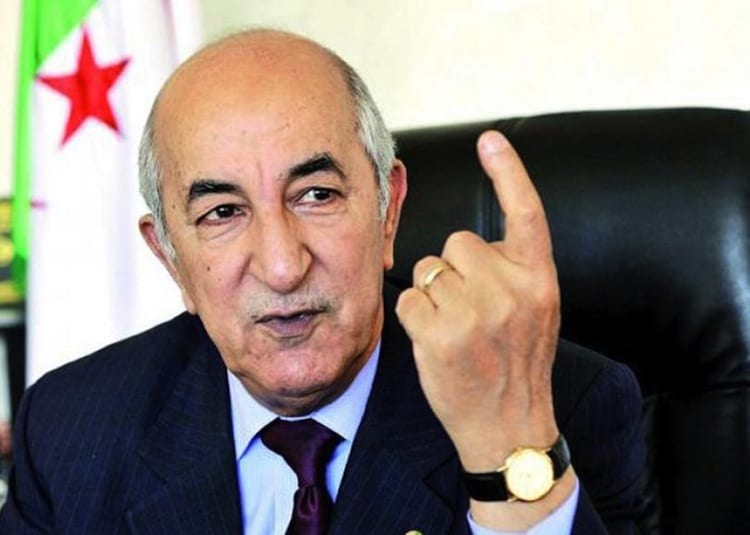Early Life and Political Beginnings
Abdelmadjid Tebboune was born on November 17, 1945, in the city of Mecheria in western Algeria. Growing up in a country still reeling from the aftermath of its war of independence against France (1954-1962), Tebboune’s early life was deeply shaped by the legacy of Algeria’s struggle for freedom. His father was a member of the National Liberation Front (FLN), which fought for Algeria’s independence, and this influence was key in shaping Tebboune’s sense of patriotism and commitment to public service.
Tebboune began his higher education at the University of Algiers, where he studied political science and law. His academic training laid the foundation for a career in civil service and politics. He initially entered the government in the 1960s as a civil servant before gradually making his way through the ranks of the country’s bureaucracy. Tebboune’s political career was characterized by his long tenure in various key governmental roles, particularly in the ministries of housing, culture, and communications. Over time, he earned a reputation as a technocrat who was committed to modernizing Algeria’s infrastructure and improving the country’s urban development.
Ministerial Roles and Rise to Prominence
Tebboune’s political rise took a significant leap in 2001 when he was appointed Minister of Housing and Urban Planning, a position that brought him to national attention. During his time in the ministry, he was credited with overseeing large-scale housing projects and contributing to the modernization of Algeria’s urban landscape. Tebboune’s ability to navigate the complex bureaucracy and his dedication to the modernization agenda earned him the trust of key political figures, and he was promoted to several other influential posts over the years, including Minister of Culture and Communications in the 2000s.

In 2017, Abdelmadjid Tebboune of Algeria was appointed Prime Minister by President Abdelaziz Bouteflika. However, his tenure in this position was short-lived, lasting only a few months. Tebboune’s political vision, which included plans for economic reforms and attempts to reduce corruption, clashed with the entrenched elites within the government, particularly those who held significant power in Algeria’s oil-driven economy. Tebboune was dismissed by Bouteflika in August 2017, which reflected the inner conflicts and factionalism within the ruling political establishment.
The 2019 Uprising and Tebboune’s Return
The political landscape in Algeria took a dramatic turn in early 2019, when mass protests erupted across the country demanding the resignation of President Abdelaziz Bouteflika. Bouteflika, who had been in power for over two decades, was seen as increasingly frail and out of touch with the country’s growing dissatisfaction with corruption, economic stagnation, and lack of political reform. The protests, led primarily by young people, were part of a broader movement calling for a change in Algeria’s political system, often referred to as the “Hirak” movement.
In the wake of Bouteflika’s resignation in April 2019, the country was left in a state of political uncertainty. Amid the unrest, Abdelmadjid Tebboune made a return to politics, positioning himself as a candidate who could navigate the transition while maintaining stability. Tebboune’s candidacy in the 2019 presidential election was heavily supported by the military and the political establishment, both of whom were eager to find a leader who could restore order to the country without succumbing to the demands for radical reform from the protesters.
Abdelmadjid Tebboune of Algeria won the presidency in December 2019 in an election that was boycotted by many opposition groups and protesters, who saw the process as a continuation of the old regime. Despite this, Tebboune presented himself as a reformist figure who sought to bridge the gap between the ruling elite and the public’s demand for change. His campaign promised political reforms, greater transparency, and a renewed commitment to addressing corruption, but many viewed him as a continuation of the status quo.
Presidency and Political Vision
Since taking office, Tebboune has faced the daunting task of managing Algeria’s political transformation. He inherited a country dealing with widespread protests, economic decline, and high levels of youth unemployment. His presidency has focused on attempting to calm the political situation while also pursuing an ambitious economic and political reform agenda. Tebboune has promised to tackle corruption within the government and to create more opportunities for young Algerians, a promise that resonates with a population frustrated by the lack of economic opportunities.
Despite his reformist rhetoric, Tebboune’s government has often been criticized for its reliance on the same political structures that had governed Algeria under Bouteflika. Tebboune’s moves to consolidate power through the military and his control over the political establishment have led many to question whether his presidency marks a genuine break from the past or merely a rebranding of the old guard. In 2020, Abdelmadjid Tebboune of Algeria faced a setback when he contracted COVID-19 and spent several months in treatment in Germany, further deepening concerns over the leadership vacuum in the country during this critical time.
Economic Challenges and Reforms
Algeria’s economy, heavily reliant on oil and gas exports, has been facing significant challenges under Tebboune’s presidency. The global decline in oil prices, coupled with the economic disruptions caused by the COVID-19 pandemic, has exposed the country’s vulnerability to fluctuations in the global energy market. Tebboune has inherited an economy plagued by high unemployment rates, inflation, and the growing need for diversification.
Tebboune has made attempts to address these issues, with policies aimed at attracting foreign investment, reducing Algeria’s dependency on oil, and developing other sectors such as agriculture and tourism. His government has also sought to reform Algeria’s complex bureaucracy, streamline state-owned enterprises, and promote greater economic openness. However, Tebboune’s ability to implement these reforms has been limited by political opposition, entrenched vested interests, and Algeria’s reliance on state control over key economic sectors. Many observers have questioned whether Tebboune’s government can move beyond the oil-dependent model and create sustainable economic growth.
Foreign Policy and Regional Influence
Tebboune’s foreign policy has been focused on maintaining Algeria’s traditional position as a regional leader in North Africa while navigating complex relationships with its neighbors, including Morocco, Tunisia, and Libya. Algeria has long been a strong proponent of African unity and the pursuit of peace and stability within the continent. Under Tebboune, Algeria has continued to support peace initiatives in Libya and has sought to strengthen its role in the African Union and the Arab League.
In terms of relations with Western powers, Tebboune has focused on maintaining good ties with countries such as France, Italy, and the United States, while also managing Algeria’s relationship with China, which has become an increasingly important partner in infrastructure and energy projects. Tebboune has emphasized a foreign policy of non-interference and sovereignty, seeking to protect Algeria’s autonomy in a volatile geopolitical landscape.
Challenges to Reform and the Future of Tebboune’s Leadership
Abdelmadjid Tebboune’s presidency is still in its early stages, and the road ahead for his leadership remains uncertain. His efforts at reform and his promises of political change are continually tested by the resistance of entrenched political and economic interests, as well as the demands of a population eager for tangible improvements in their living standards. The ongoing challenge of balancing the expectations of the Hirak movement, the military establishment, and the business elite will define Tebboune’s political legacy.
While his presidency has provided a semblance of stability following the upheaval of Bouteflika’s departure, Tebboune’s leadership will ultimately be judged by his ability to enact meaningful change in a country facing deep economic challenges and political unrest. How he navigates these complex pressures will determine whether his presidency marks a true transition to a new era for Algeria or a mere continuation of the old system under a new face.
